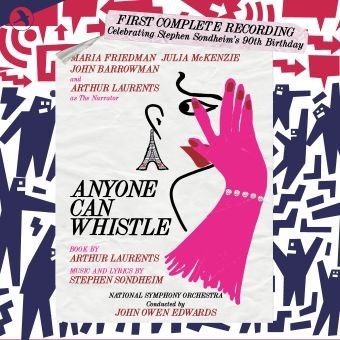ANYONE CAN WHISTLE,
BUT VERY FEW CAN WRITE A SCORE LIKE THIS
According to Collins English Dictionary, a cult classic is “a work of art with a small but passionate fan base”. It can be a novel, TV show, or movie, all easily accessible to the enthusiast: you buy the book or watch the show on YouTube. Cult films offer even more attractive options — you can go to a screening dressed as your favorite character; in fact, there can be few more rewarding experiences in contemporary culture than attending a Sound of Music sing-along in full costume. Which brings us to the cult stage musical, a more elusive proposition. True there’s the original cast album, but a musical only really comes to life in stage performance, and who’s going to revive a flop?
Anyone Can Whistle is a textbook example of the cult stage musical. A notorious failure in 1964, it’s had no major revival since, which makes this recording all the more welcome. It’s the closest thing to a stage production we’re likely to get.
Maria Friedman, John Owen Edwards, John Yap, and Stephen Sondheim at Abbey Road Studios.
Before he was thirty, Sondheim wrote the lyrics for two of the most successful Broadway musicals of all time: West Side Story and Gypsy. If he had written nothing else Sondheim would still be rich and famous, but his ambition was to write lyrics and music for the theatre. In 1962 he achieved that goal with A Funny Thing Happened on the Way to the Forum, a knockabout farce with a bouncy, tuneful score — a far cry from what we now think of as a Sondheim show.
Two years later, Arthur Laurents, co-creator of West Side Story and Gypsy, invited Sondheim to collaborate on a much more challenging project. By 1964 Broadway had come a long way since Rose Marie and No, No, Nanette, but it still wasn’t ready for Sondheim. That season’s biggest hits were Funny Girl and Hello Dolly! — frothy star vehicles with upbeat storylines. By contrast, Anyone Can Whistle is cold, cynical satire — and satire, as George S. Kaufman famously said, is what closes on Saturday night; in this case he proved all too right. The show was universally panned and closed in a week. Anyone Can Whistle was all but forgotten until Sondheim’s series of dazzling collaborations with Harold Prince renewed interest in his earlier work.
Stephen Sondheim at Abbey Road Studios.
Anyone Can Whistle is the story Cora Hoover Hooper (played here by Julia McKenzie), corrupt mayoress of an economically depressed New England town, who boosts tourism by claiming that the water of a local spring has miraculous healing powers. It’s about human greed, dishonesty, and political corruption, in other words a show more suited to our own times than to Broadway in the 60s.
An original cast album was made the day after the show closed, but in 1964, a show album had to fit onto two sides of a 12-inch LP, and inevitably several songs and most of the incidental music had to be cut. This new recording, spread lavishly over two CDs, was made with Sondheim’s blessing in 1997. It’s now reissued with additional tracks recorded in 2020, making it the score’s first complete recording. It boasts a trio of fine Sondheim interpreters at the peak of their powers. Ms. McKenzie, as the unscrupulous Cora, brings the true voice of Broadway to “Me and My Town” and “There’s a Parade in Town”. In vivid contrast, Maria Friedman as the repressed Fay gives us a wistful, heartbreaking rendition of the title song, and John Barrowman, as the hapless Hapgood, has a ball with the extended ensemble number “Simple” which, being a Sondheim song, is not simple at all. An augmented orchestra doubles the size of a pit band, and is conducted with panache by the great John Owen Edwards. The vibrant orchestral sound is particularly effective in the previously unrecorded dance music, revealing the beginnings of Sondheim’s mature style.
Julie McKenzie, John Yap, and Maria Friedman
It may be unfair to compare this new recording to the original cast album, but it’s a fascinating exercise. In the original, Angela Lansbury is heard at the very beginning of her distinguished musical theatre career, and her performance shows the promise fulfilled in Mame, Dear World and Sweeney Todd. By contrast, Julia McKenzie brings thirty years’ experience of singing Coward, Loesser, Bacharach, Coleman, and of course, Sondheim to the party. Both performances are equally valid portrayals of the venal, manipulative mayoress, and by an interesting, but completely irrelevant coincidence, both actresses went on to play famous lady detectives on television.
The recording is issued by Jay Records, a London-based company who are doing sterling work in preserving our musical theatre heritage. Their recent reissue of a very different 1964 flop, Sandy Wilson’s Divorce Me Darling! is a totally unexpected delight.
Twenty years into the 21st century, Company, Follies, A Little Night Music, and Into the Woods have entered the mainstream repertoire, and Merrily We Roll Along is almost there. Anyone Can Whistle may not be in that league, but this excellent recording will surely increase awareness of a neglected work, and with luck encourage a full-scale revival.
Julia McKenzie
photos courtesy of Jay Records
Anyone Can Whistle
First Complete Recording
JAY Records | 2 CDs | November 5, 2020
available at Amazon and JAY Records
